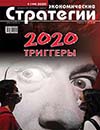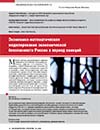Economic and Mathematical Modeling of Russia’s Economic Security in the Period Under Sanctions
DOI: 10.33917/es-2.168.2020.32-39
For the study, the time period of introducing economic sanctions against the Russian Federation was selected. In consideration are taken the data of Rosstat in terms of finding the values of indicators of our state’s economic security (2013–2017). A correlation and regression analysis of this system, consisting of 15 indicators, was carried out. An economic-mathematical model of the sanctions impact on the economic security of Russia was compiled. To solve this problem, the authors used a correlation-regression analysis, the regression equation was found and statistical significance of the constructed model was substantiated. The findings were recommended to specialists in the sphere of improving the state’s economic security
References:
|
1. Kazantsev S. Russia’s foreign trade under the anti-Russian sanctions. Review of Business and Economics Studies, 2018, no 3, pp. 44–56. 2. Mironova O.A. Problemy obespecheniya prodovol’stvennoi bezopasnosti Rossii na makro- i mezourovne v usloviyakh vneshnetorgovykh sanktsii [Problems of Providing Food Security of Russia at the Macro- and Meso-Level in the Context of Foreign Trade Sanctions]. Economics. Law. State, 2018, no 1, pp. 22–30. 3. Mikhailets A.V., Beshkoreva V.Yu. Bezrabotitsa sovremennoi molodezhi [Unemployment of Today’s Youth]. Economics, 2016, no 1, pp. 10–11. 4. Ploskova V.A., Shanikhina N.N. Sovershenstvovanie bankovskoi sistemy na sovremennom etape [Banking System Development at the Present Stage]. Economics, 2016, no 1, pp. 86–91. 5. Udartseva A.L. Problemy i napravleniya sovershenstvovaniya denezhno-kreditnoi politiki banka Rossii [Challenges and Areas for Improving Monetary Policy of the Bank of Russia]. Economics, 2016, no 6, pp. 61–63. 6. Bekker P.R. Investitsionnaya privlekatel’nost’ Rossii v sovremennykh geopoliticheskikh usloviyakh [Investment Attractiveness of Russia in Modern Geopolitical Conditions]. Economics, 2016, no 6, pp. 42–44. 7. Petrov N.T. Tendentsii izmeneniya kontsentratsii rynka v Rossii v period ekonomicheskogo spade [Trends in Market Concentration in Russia During the Economic Recession]. Economics, 2018, no 2, pp. 39–41. 8. Listopad M.E., Smirnova G.I. Analiz chuvstvitel’nosti natsional’noi ekonomiki Rossii k vneshnim negativnym trendam [Sensitivity Analysis of the Russian National Economy to External Negative Trends]. Ekonomika: teoriya i praktika, 2018, pp. 4. 9. Neilor T., Boton Dzh., Berdik D., et al. Mashinnye imitatsionnye eksperimenty s modelyami ekonomicheskikh system [Machine Simulation Experiments with Models of Economic Systems]. Moscow, Mir, 1975, 500 p. 10. Dubina I.N. Osnovy matematicheskogo modelirovaniya sotsial’no-ekonomicheskikh protsessov [Fundamentals of Mathematical Modeling of Socio-Economic Processes]. Ucheb. i praktikum dlya bakalavriata i magistratury. Moscow, Yurait, 2018, 349 p. 11. Federal’naya sluzhba gosudarstvennoi statistiki, available at: http://www.gks.ru. 12. Zor’ka E.I. Korrelyatsionno-regressionnaya model’ indikatorov ekonomicheskoi bezopasnosti Kyrgyzskoi Respubliki [Correlation-Regression Model of Economic Security Indicators of the Kyrgyz Republic]. Nauchno-issledovatel’skii elektronnyi zhurnal “Ekonomicheskie issledovaniya i razrabotki”. N. Novgorod, 2017, available at: http://edrj.ru/article/14-04-17. 13. Illarionov A.N. Kriterii ekonomicheskoi bezopasnosti [Economic Security Criteria]. Voprosy ekonomiki, 1998, no 10, pp. 35–57. |



